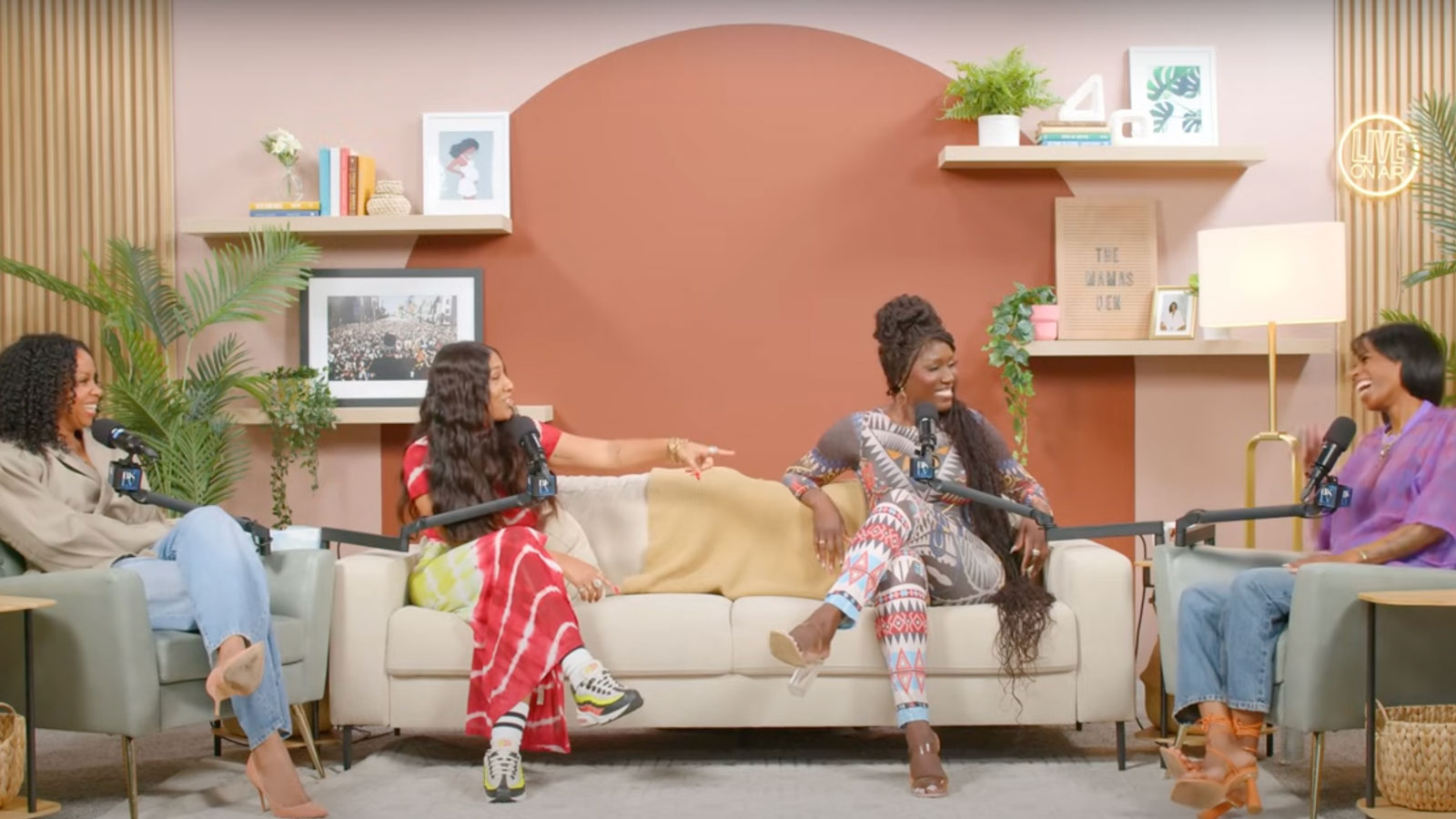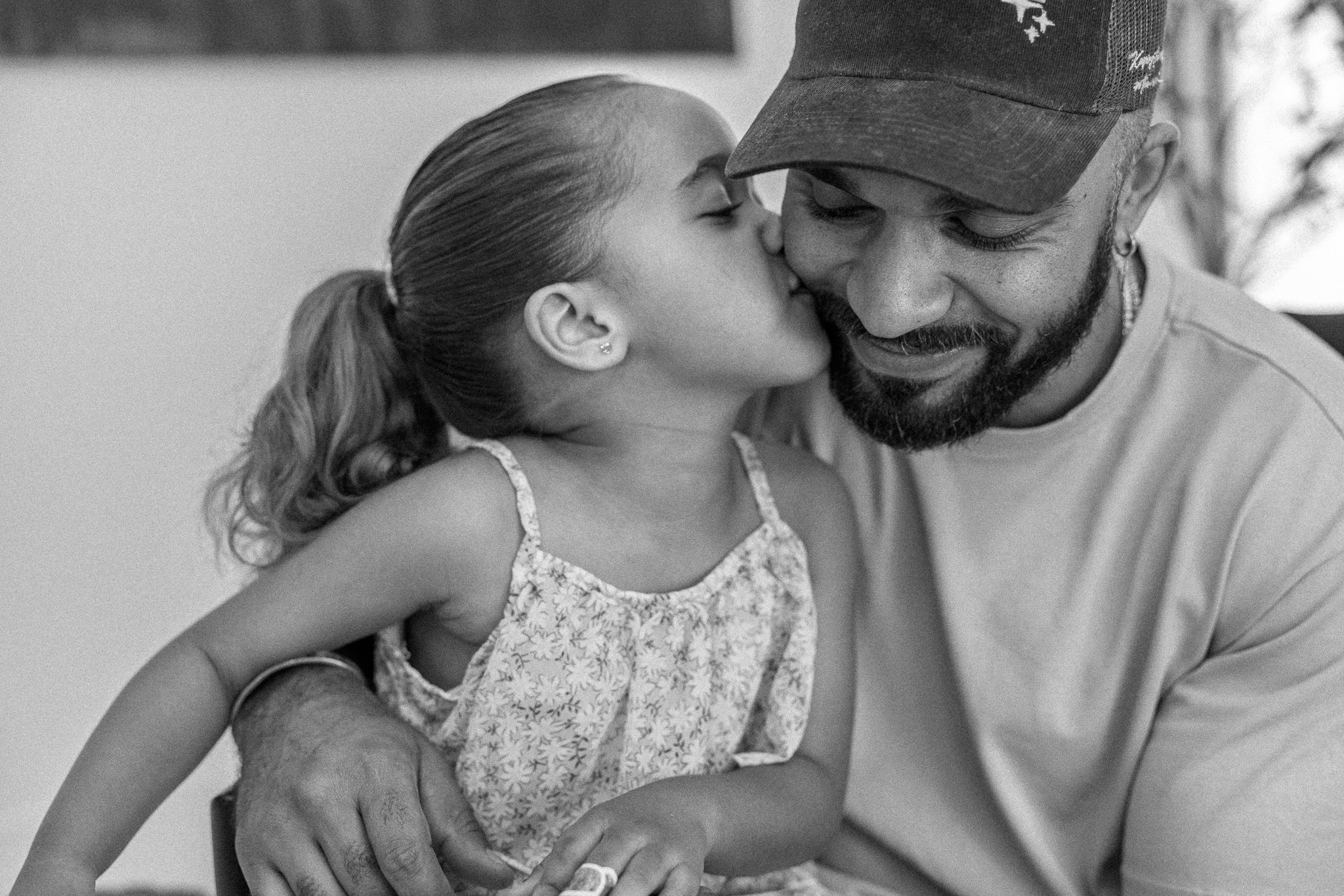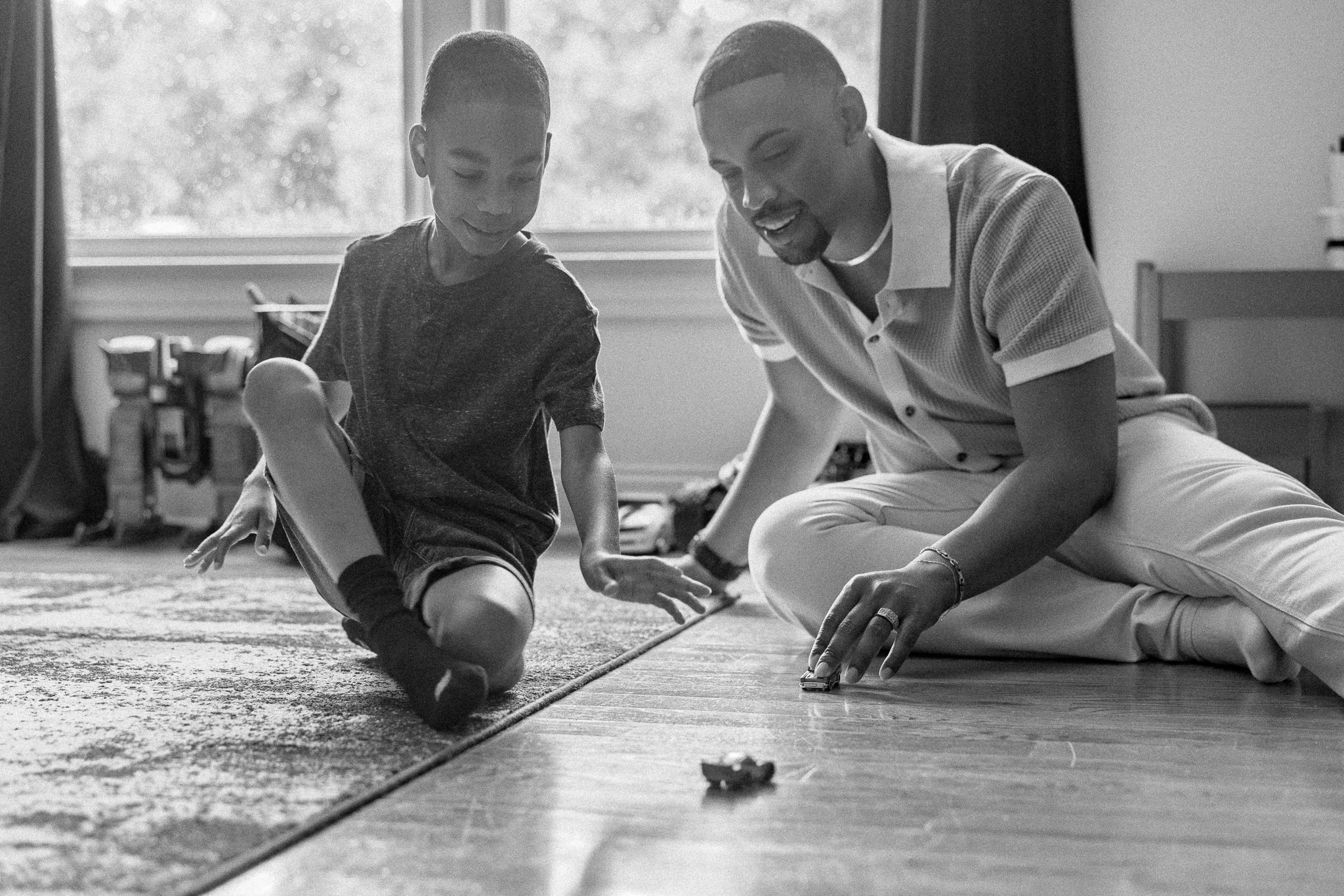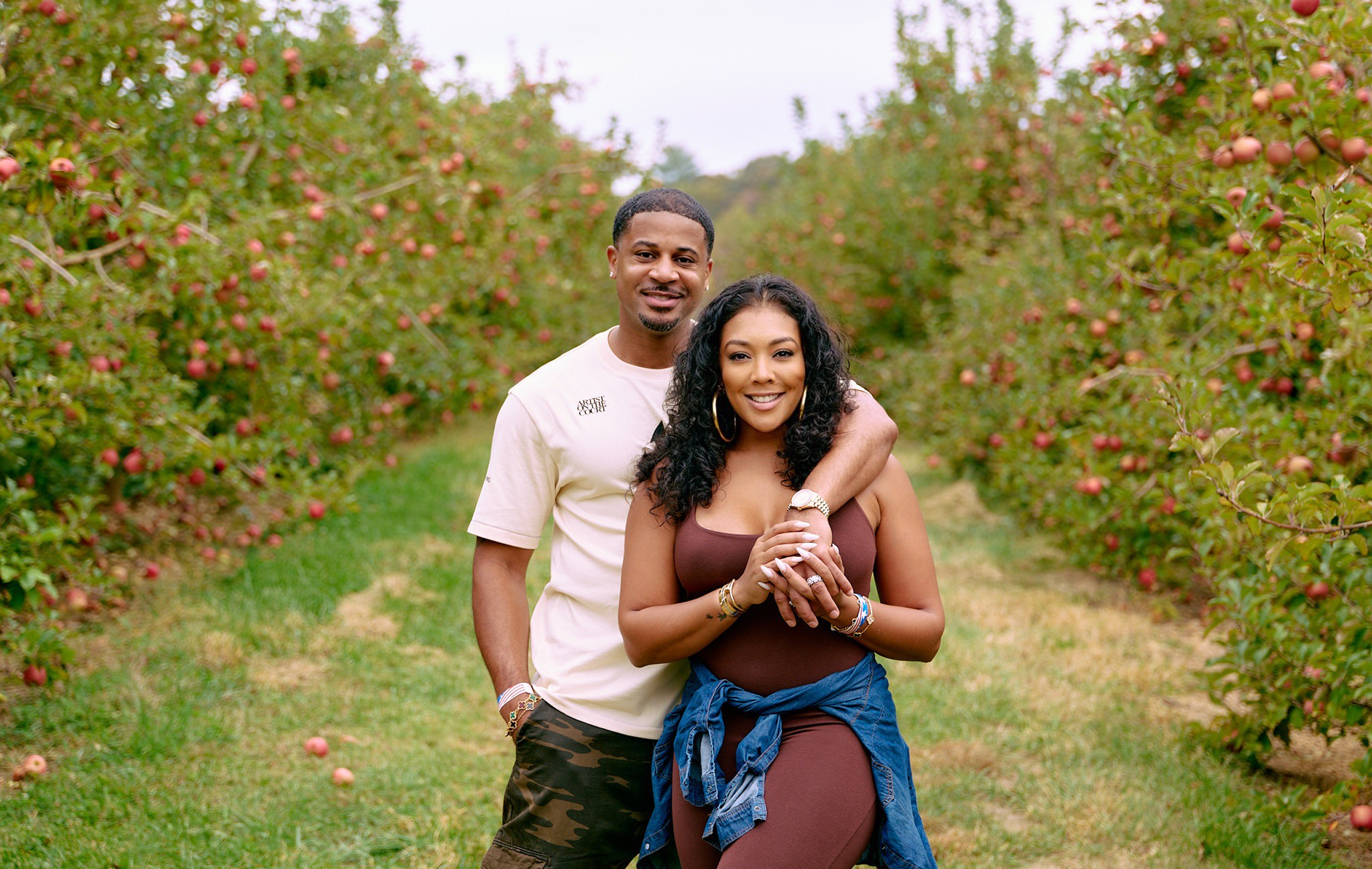
Courtesy of @ allycinhicks/Instagram
Courtesy of @ allycinhicks/Instagram

Dr. Allycin Powell-Hicks with her mom, Dr. Cynthia Powell-Hicks
Dr. Allycin Powell-Hicks is the host of Discovery+ and OWN: Oprah Winfrey Network series “Like Mother, Like Daughter” which explores the broken relationships between mothers and daughters. Each week, along with her mother Dr. Cynthia Powell-Hicks, they expose and deal with old secrets, reopen old wounds and reveal deep-seated issues in order to heal trauma and repair their relationships. With Mother’s Day and Father’s Day behind us, we asked Dr. Ally to discuss the parent wound with Black Love and how we can explore forgiveness with our parents, acknowledge pain, and reparent ourselves.
Yasmine Jameelah: As a therapist, is there a way that you feel like we should go about approaching people who are sensitive to Mother’s Day/Father’s Day holiday or even ourselves if it’s us?
Dr. Ally: That’s a twofold question. If you are a person who doesn’t have a great relationship with a father or your mother, I’m always leaning into, like, coping mechanisms, figuring out what works for you. What works to help you elevate your own mood? There are external coping mechanisms. There are internal coping mechanisms. So an external coping mechanism is something like listening to music, going on a walk, hanging out with friends, and having conversations with the things that exist outside of your own space. And those are wonderful, and those are great, but I’m really trying to lean people towards more internal cooking mechanisms because everybody’s burned out. And so it’s hard to find someone all the time, and so it really impacts you heavily. If your only coping mechanism is leaving the house, and we’re in a lockdown and you can’t go anywhere, that’s not the greatest thing for you. So also investigating your internal coping mechanisms, which are things like creating meaning, understanding what this experience of not having a great relationship with a parent means to you, what is that was given to you?
What is it that was taken from you? That’s meaning-making, then there’s obviously changing and pivoting your thoughts. There’s deep breathing and focusing on your breath, which would be like in the line of mindfulness. And there’s kind of like being able to create that calm, still internal place, tapping into joy and happiness. So those are like internal coping mechanisms, things you take with you no matter where you go. And so that’s one thing like take care of yourself, know what makes you feel good because it can be a hard day for me personally, I lost my dad three years ago. It was really crazy and unexpected. But yesterday was his Death Day anniversary. And so with Father’s Day, I just kind of ignore it personally. There’s nobody for me to celebrate personally. My husband and I don’t have any children but my friends who are fathers, I might shoot them a text and then kind of keep it moving. Because for me, I have found ways to create meaning out of what happened with my Dad, out of the relationship that he and I had. Because I am one of the lucky people that have a really good relationship with her Dad. And so I don’t have a lot of things to dig through in that space. Right? It’s more so about the loss. But that’s the coping for me. The coping then when it comes to helping other people with their feelings of maybe loss or not having a good relationship, I think the same is true. It’s really letting them lead. If they bring it up, go with them. If they don’t, don’t push it. Because sometimes we have an idea of how things should be but you don’t always need to talk about things, especially in the moment of holidays like Mother’s Day and Father’s Day.
Yasmine Jameelah: That’s great advice. Let’s dig deeper into Daddy/Mommy issues because I often feel like we only talk about the extremes of those relationships (people whose parents who abandoned them completely or highly dysfunctional relationships between parent/child estranged from one another.) when there are layers to dysfunction and breakdowns of relationships. I remember being a child, feeling disappointed by my father and hearing comments from relatives like “At least you have a Dad, my father was never even there.” So I wonder can you be appreciative of their presence, but also acknowledge/yearn for what you didn’t have?

Courtesy of pexels.com
Dr. Ally: Yes. One thing my therapist pointed out to me years ago is that when you start to hear people speaking in black and white in yeses and no’s in absolutes of two different balances, you start to think about trauma. Because the world isn’t black and white, like you said, there are layers and levels to relationships that you have with people. And all of us have dynamics in relationships with every human in our life right? There is no purely good or purely horrible relationship. They’re all a mixture. But I think that our community has experienced so much trauma that we’ve not even been far enough away from our trauma to be able to process it. And so when I hear things like just being thankful that you have a Dad because they didn’t have one, I’m hearing somebody who’s really sad, broken and who’s really traumatized by not having somebody that’s so important to your life. It’s important to get to know the two people who came together to make who you are in your corporeal sense and who added to your personality traits and your sense of being in all of this. And not having a part of that is so not just damaging socially or financially, but egotistically. It damages our sense of who we are as a person. Because, interestingly enough,, we’ve only developed this sense of self over the past few hundred years. A few thousand years ago, we didn’t have a sense of self. Our sense of self was connected to the group. So if you were exiled, it was a big deal because you were actually losing part of your identity by being kicked out of group. So not having one of the parents in your life doesn’t just impact the external things again, it goes back to impacting the way we even do we are. And having a disordered relationship, an anxious relationship or any other type of damaged relationship will cause you to wonder like what’s wrong with me?
As you mentioned very early on in our conversation, a lot of us seek to change the way that we parent because of the way we were parented. Right. And so a lot of the relationships that we have with others impact the way that we see who we are and how we want to function in the world.
But I would say try not to experience guilt. If somebody telling you, well, at least you have one, you shouldn’t complain. But it’s like no, because there’s appropriate and inappropriate guilt. Appropriate guilt is when you do something to injure another person typically purposefully. You feel guilty. So you can improve the relationship, so you can fix what happened, you can apologize, you can repay them, do whatever. But if you can’t repay and fix an injury, there is no point in feeling guilty. So you cannot be guilty for having a death. You might feel guilty, but you have to kind of tell yourself, like, did I do something wrong in having a fine life? No. So adjusting kind of your own internal experiences of it and saying like, okay, I’m not going to feel guilty for this. I’m going to appreciate my dad for the things that he’s done and I’m going to sit in gratitude to some of the great parts of him and the things that he taught me and the things he’s given me. But then I’m going to be honest with myself about like I didn’t like when he did this thing.
Yasmine Jameelah: I don’t have any kids yet, but this generation, like others in the past, is intent on changing the way we parent. Would you say our desire to want to create healthier families (mentally, emotionally, financially etc.) is somewhat intertwined in the parent wound and trying to repair that? there still work to do even after you create the family you always wanted?

Courtesy of pexels.com
Dr. Ally: Yeah, there’s definitely still work to do because I literally have been preaching about this a lot lately. Because a family, again, is external. That’s an external coping mechanism. Your family, again, if you put all of your sense of coping and goodness on the people outside of you, that can actually cause a lot of chaos for you. Right. If you place on your kids, you’re going to fix me, but your kids are like, nah, I’m not interested in that. Then you might get hurt. From the time you give birth to them, they are seeking to get away from you. That is the whole point right? They’re seeking to travel and learn and grow and vent. And if you don’t let them do that because you have a very rigid idea of what you need from this family, then you can actually start to see your family push away from you more and you start to kind of recreate these patterns from your past.
If we don’t address the patterns from our past on an internal level, through awareness, through grief and mourning, through acceptance and meaning-making, then we are going to have a very hard time moving forward in a way that works for us. And one way I like to talk about it is it’s about moving towards what you want and not just away from what you don’t. A lot of us are moving away from what we don’t want. I had a family that I didn’t like. For example, if your Dad wasn’t around. So you’re like, I’m just going to be present. I’m going to be super present, and I’m always going to be there. But they don’t know how because they haven’t done the work to figure out what is presence means. Because presence to you is not the same as presence to me.
Like you said earlier, you could have a Dad that sat in the house with you every single day and you said two words to him in 20 years. Was he present? Physically, yes. Emotionally, no. Maybe spiritually, no. And so it’s about doing that work. You can do that with a therapist. You can do that with your boys, you can do that with your friends. You don’t have to work with the same type of person in order to do this work, but you just have to do the work. You have to look inside so that then when your kids come into this world, you can say, I’m going to be different because I think this is good for my kids. Because each kid is a little different, too. One kid might need you to be extra soft with them. One might need you to really hug and cuddle and kiss and hold, and your other kid is like, no, thank you, but can you go on a walk with me? Can we go play sports? You just need to get to know them, and the more work you do on yourself, the more aware, and impressive you’re going to be in a given moment to give your family what it is they actually need instead of living in this past tape of like, oh, well, kids need this because I needed this, and so everyone must need the thing that I need.
Related Articles:
My Dad, Me, and the Healing Power of Forgiveness
How My Daddy Issues Resurfaced After Seeing My Husband and Daughter’s Bond
How Therapy Changed My Life
Yasmine Jameelah: Wow, I never thought about it like that. So many of us are approaching parenting from a selfish perspective?
Dr. Ally: Yes and it’s literally not going to work because you’re selfishly putting everybody in a position to constantly be feeding your same pattern.
Yasmine Jameelah: What does the internal work of processing grief look like?
Dr. Ally: It’s going through the process of identifying where your pain is because often, we don’t access it. We just keep moving because we’re busy, we’re stressed, we’re traumatized. We live in this hustle culture. We’re constantly moving, moving, and there’s not a lot of space for sadness. So we end up kind of storing it and squirreling it away and squirreling it away and squirreling it away and not processing it. And so, okay, I’m going to get weird, but sometimes I will just sit and cry. I will meditate and I will feel inside of my body like, where is my sadness? Sometimes it’s like my lower ribcage, kind of like this area down here. Sometimes I’ll even feel it in, like, my thighs and my hips, and I will just sit with it and I’ll try to figure out what is it that I’m sad about. I didn’t remember that my dad died yesterday. I was on the way to a gynecologist appointment. So now I’m dealing with I carry a lot of my pain and sadness in my hip, and now I’m dealing with a person who is going to be focused on that area while I’m also dealing with this loss that I forgot about.
So there’s a piece of me that’s feeling guilty for kind of not being a part of this dream. And then now it’s making sense that that’s why I woke up with a headache. That’s why my back hurts today. That’s why my hips are extra tight. And so I just came home and I’ve done a lot of processing with my dad’s loss, but I just came home and I just thought about him. I imagined his face, and I just cried just to let the grief pass through me. Because it’s going to always kind of be here, right? We act like there’s like a destination. Like all of a sudden, we’re going to get to no more grief town, and that’s where we’re going to live for the rest of our lives. No brief land. And that’s not realistic, unfortunately, that we’re going to travel in and out of grief and sadness, and there’s going to be moments when we’re going to be really great, and there’s going be to moments where we’re like, wow, I wish that Chris was here. I’m so thankful that I’m doing this thing. Oh my God, I wish my mom, grandma, uncle, aunty, dad, whoever was here to see it, and then the grief will kick in, and it is okay to fully embrace that at the same time.
And I think the more that we learn to embrace our emotions, the better we’ll actually be at embracing the positive emotions too. Because sometimes the sadness will be a spectrum, a ghost behind us, not allowing us to fully experience the positive things either. So I will let the sadness wash over. I can actually feel it now in the back of my thigh. When hair stands up on a cat, I kind of get like down my side with, like, a sensation. And right now rolling over my shoulder and just sitting with that and understanding it, breathing through it and honoring it, and then get skeptical because guess what? It always leaves. It doesn’t last forever. In psychology, they talk about how emotions are like waves. They come and then they go. Waves are of different signs. Some are tsunamis. They destroy towns and villages, and others are just they hit your ankles and they wash away. And the more that you practice it, the better it’ll get and the better you’ll get at it. I guess the word would really be honoring the sadness, honoring the grief and allowing yourself to move through it.
Yasmine Jameelah: As you move through your emotions, I think about forgiveness. Is forgiveness a necessary tool to forgive our parents and move forward? I think it is, but I’m curious of your perspective.

Courtesy of nappy.co
Dr. Ally: That’s hard because forgiveness is such a personal thing. As you were talking, I was thinking I kind of find forgiveness almost to be a sign of healing. It’s kind of evidence that a person is starting to process through things. It doesn’t mean that if you haven’t forgiven someone that you aren’t healed. I don’t want to say that either, but in some circumstances, I’ve seen that there is some evidence to show that on a neurological level, on a brain structural level, some people are born more forgiving than others. It has to do with the dorsal medial prefrontal cortex. I personally am a very forgiving person. There’s very rarely a person that I don’t like. And if I don’t like them still, it’s because I just have yet to see them again. If I see them, it would be all hugs and kisses and I will literally be like, I’m over it. I’ve been like that since the minute I was born. Well, but some people aren’t built that way. And so can we say that those people who maybe just really aren’t built that way, that something is wrong with them?
I don’t want to necessarily say that either, but I do think forgiveness is for the person doing the forgiving and not for the person who abreast and hurt them. There are studies that show that forgiveness can decrease your heart rate, can increase your blood pressure, can increase stress and cortisol relief. And because when you’re holding on to anger, when you’re holding on to resentment, over time it can damage your cardiovascularly and with all stress linked and mediated disorders. So there is a benefit to forgiveness.
Yasmine Jameelah: Okay let me go forgive everybody because that is crazy.
Dr. Ally: (Laughs) Right?! Think about it this way. Imagine somebody that you’re really mad at. Like imagine them in your head, right? Remember what they did to you. It made sure your heart rate goes up. Yes, your stomach might start churning, you might start sweating in your palm. So that’s a stress response that you get ready to fight, that you get ready to run, but you’re not going to actually do those things. You can’t take the stress out. You’re just actually kind of like playing angry over and over and over again. The act of forgiveness allows you to put that down. But what’s tricky about forgiveness is I do go to the Bible verse that I don’t remember the verse, but it is forgive 70 times seven. And what that tells me is that not that you forgive over and over and over again, but is that every time you think about what that person did to you, it will make you a little angry and you actively are having to forgive again and again and again and constantly put that down and say, okay girl, you were fucking rude. But you know what? I’m just sending forgiveness again in my head, right?
Yasmine Jameelah: What advice would you give to anyone that wants to forgive and repair a fractured relationship with their parent?

Credit: iStock
Dr. Ally: Well, one, I always ask how dangerous are they? Because you can forgive somebody and never deal with them again. If you have a parent that is physically abusive, emotionally abusive or sexually abusive, you can forgive them from a distance. You do not have to welcome them back into your life. I’m a believer in collectivism. I am a believer in connecting with your family and being in family systems and intergenerational households and lifestyles and things like that. But I’m not a fan of toxicity. I am not a fan of abuse and in any way, shape or form. And if those are things that are part of the relationship. You can’t forgive and maintain very serious boundaries and very serious distance. And if that looks like me never maybe talking to this person again, it doesn’t matter who they are to you. If they are bad for you, you have to keep a distance. But if they’re not like, let’s say maybe they were. I had a lot of people that I’ve worked with that had parents maybe were using when they were younger, using substances which can lead to neglect, and negative things can happen to kids over good parts of their lives. And maybe years later this parent is maintaining a really healthy lifestyle now that could be a person that you can start to reintroduce into your life in small ways, ways that feel comfortable to you.
I would be very patient with myself in the forgiveness process as well. And maybe test things out so I could eat with them in a public place to see how you feel afterward. Sit quietly with yourself and be like, how was that? You don’t have to dive directly back into like, okay, we’re going to move it together and we’re going to be mom and daughter again, and it’s going to be fine, and he’s going to be my dad again and everything, because that might not be the reality. It’s also okay to forgive and not re-engage. And honestly, if you’re still working on forgiveness, don’t judge yourself for not being able to forgive someone for doing something horrible.
Yasmine Jameelah: So we’ve touched on anger, dealing with grief, doing the internal work and external work, and then also trying to mend relationship. But if we either don’t have the opportunity to mend or are not interested, how can we work on reparenting ourselves?
Dr. Ally: When it comes to reparenting it’s about figuring out what was missing. Asking yourself what do I do to honor this twelve-year-old, nine-year-old, eight-year-old me? How do I make her feel safe? What was she missing? In very general terms, we get nurturing from mom and we get security and protection from dad in very general terms. And so if one of the relationships is damaged, you can feel unsafe. And so we’re looking at healing those spaces. It can look like for a woman reminding herself “baby girl, you’re safe” instead of looking for safety in a man who may resemble safety but may or may not be abusive or for a man allowing yourself to soften and allow balanced masculine energy that makes room for vulnerability. Every individual should look into what it actually means for them.
Related Articles
Bozoma Saint John talks Black motherhood, grief, self-love, and finding joy again. Don’t miss her powerful conversation on building legacy and living boldly.
Tyler Lepley shows the beauty of Black fatherhood, blended family life with Miracle Watts, & raising his three children in this Father Noir spotlight.
Black fathers Terrell and Jarius Joseph redefines modern fatherhood through love, resilience, unapologetic visibility in this Father Noir highlight.
Featured Articles
When Elitia and Cullen Mattox found each other, they decided that they wanted their new relationship together, their union, to be healthier and different.
Celebrate their marriage and partnership with the release of the documentary “Time II: Unfinished Business”
The vision for our engagement shoot was to celebrate ourselves as a Young Power Couple with an upcoming wedding, celebrating our five year anniversary - glammed up and taking over New York.
Meagan Good and DeVon Franklin’s new relationships are a testament to healing, growth, and the belief that love can find you again when you least expect it.
Our intent is to share love so that people can see, like love really conquers everything. Topics like marriage and finance, Black relationships and parenting.
HEY CHI-TOWN, who’s hungry?! In honor of #BlackBusinessMonth, we teamed up with @eatokratheapp, a Black-owned app designed to connect you with some of the best #BlackOwnedRestaurants in YOUR city – and this week, we’re highlighting some of Chicago’s best!











